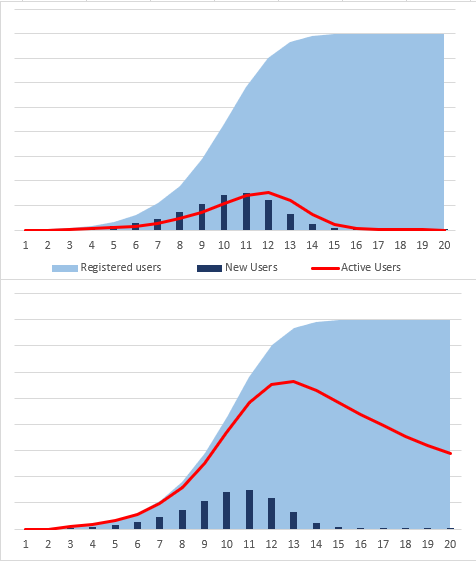- ARPDAUPosted 12 years ago
- What’s an impressive conversion rate? And other stats updatesPosted 12 years ago
- Your quick guide to metricsPosted 12 years ago
SP-elling it out. How balancing your players on an “SP” knife edge is the secret to social games success
Like many former Farmville players, I’ve migrated to Cityville. I’ve been marvelling at the elegance with which they have honed the fundamental tradeoffs a social gamer needs to make.

(Note: these techniques are key to a successful social game. How cynically you choose to push them merits further discussion.)
The four SPs
As you play Cityville, you are frequently based with a choice. To advance further in the game, you have to:
- Spin your wheels (i.e. wait until tomorrow)
- Spam your friends
- Spend money
- Engage with Sponsors
It’s not always quite as elegant as this, but here’s my analysis of the four SPs are so important, and how you can use them to deliver on the all-important Acquisition-Retention-Monetisation strategy.
Spin your wheels (or “wait until tomorrow”)
Many of Zynga’s games have the concept of energy. You have a finite amount of energy which you can use to collect run, harvest crops or construct buildings.
When it’s gone, you can choose to wait until the energy replenishes, ask your friends for “energy” or get out the credit card.
If you choose to wait, Zynga wins. One of the key success metrics for a social game is “engagement” or “retention”. DAU/MAU is a great proxy for this.
It’s so important because an engaged user is more likely to buy virtual goods. They are more likely to spread the word about your game. They are more likely to see ads.
So the first of Zynga’s choices – to spin your wheels and wait, a.k.a come back tomorrow – drives Retention for their game.
Spam your friends
This is pretty self-explanatory. When you run out of energy, you can ask for more. If you invite friends who aren’t playing the game, you are driving Acquisition. If you ask friends who are playing the game, you are driving Retention.
How are you doing this? In several ways:
- When you ask for energy, your friends get a message saying that you would like some energy.
- If they send it to you, they have done you a favour. For many people, this creates a sense of obligation, triggering your need for Reciprocity. This can create an endless cycle of gift-giving, driving Retention
- You are reminding your friends that you are still playing the game. Social Proof is a powerful technique for encouraging customers to do something. If your players see that their friends are still playing, it encourages them to keep playing your game.
Spend money
A social game that can’t generate revenue will be a short-lived social game. By offering the player a chance to buy energy, Zynga is tapping into several different play styles:
- the impatient: I want to level up. I don’t want to wait until tomorrow
- the competitive: if I buy some more energy, I’ll catch up with Bob, who is one level ahead of me
- the completist: I’ve nearly finished that building. Just two more energy points and it will be done
There are many more reasons to want more energy. As you play these games, look inside yourself and see what your motivations are.
Sponsorship
The motivations here are just the same as for spending money, but instead of reaching for the wallet, a gamer can undertake any of the offers put forward by companies like Tapjoy and Offerpal. It’s a way for people who are short of money to buy virtual goods with their time or their attention.
The knife-edge
The simple trick that Cityville pulls off well is to offer players this balance. Do I want to wait, spam my friends or spend money? The reality is that different people want to do different things. Those preferences might vary with how often they play the game, how rich they are, whether their friends are playing and even just what mood they are in.
Whichever of the options are chosen, Zynga achieves one of its core objectives.
That’s good design.













